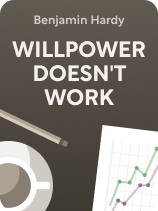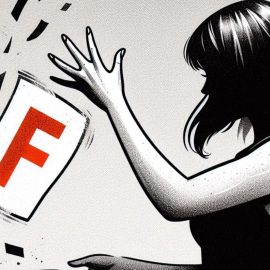

This article is an excerpt from the Shortform book guide to "Willpower Doesn't Work" by Benjamin Hardy. Shortform has the world's best summaries and analyses of books you should be reading.
Like this article? Sign up for a free trial here.
Do you want to break free from negative thought patterns? Do you find yourself repeating the same unhelpful habits day after day?
Optimizing your mental environment is key to achieving your goals and living a fulfilling life. In Willpower Doesn’t Work, Benjamin Hardy says that, by redirecting your thoughts and modifying your habits, you can create a more positive and productive mindset.
Keep reading to discover practical strategies for transforming your mental landscape.
Optimize Your Mental Environment
Hardy says it’s important to optimize your mental “environment”—which is to say, your thoughts and habits. He recommends deliberating redirecting your thoughts and changing your bad habits into good ones.
Intentionally Redirect Your Thoughts
One way Hardy suggests optimizing your mental environment is by anticipating and counteracting thoughts that could make you fall short of your goals. In other words, expect yourself to fail, but use that expectation to put a plan in place so you can avoid that failure.
For example, suppose that your goal is to eat healthier, but you know you have a sweet tooth that could derail that goal. You might set the following plan: “The next time I’m craving sweets, I’ll eat an apple instead.” Hardy calls this an implementation intention.
Implementation intentions are essentially if-then statements, even when they’re not worded that way. So, the previous example could be rephrased as “If I have a sugar craving, then I will eat an apple.”
(Shortform note: Implementation intentions are relatively simple yet highly effective. An analysis of 94 studies on this topic found that this technique had a moderate to strong effect on achieving goals. In layperson’s terms, people who used implementation intentions were—generally speaking—better able to start working toward their goals, prevent themselves from getting distracted, and rest as needed to avoid exhaustion and burnout.)
Break Bad Habits by Altering Them
Another way Hardy suggests optimizing your mental environment is to recognize and break the bad habits that are getting in the way of your goals. However, as always, he says you should do so in a way that minimizes the role of willpower.
Therefore, instead of trying to overcome bad habits through force of will, try to identify the triggers that prompt these habits. For instance, say you have a bad habit of staying up late playing video games. You might realize that seeing a particular time on the clock prompts you to start playing, with the assumption that you’ll play for a half hour and get to bed at an appropriate time—but then you play for an hour or more, go to bed late, and wake up tired the next day. You might break that pattern by getting rid of the clock so you never get that prompt to start playing. Another option would be to move the clock forward by an hour so you start playing sooner and still get to bed by the time you intended.
| Start by Changing Just One Habit You might be tempted to try changing numerous bad habits at once. However, that’s very difficult—meaning that it requires a lot of willpower—so you’re likely to fail and get discouraged as a result. That’s why Charles Duhigg (The Power of Habit) suggests starting with just one habit you’d like to change. Duhigg says the benefits of changing that one habit will then motivate you to change other habits and make it easier to do so. For example, if you’re a smoker, that’s a habit you probably want to change. Once you’ve been smoke-free for a while, you’ll find that you can breathe more easily, and you have more energy as a result. Those health benefits make exercising easier and more enjoyable, so then you might get inspired to replace another bad habit with regular workout sessions. |
Hardy also proposes modifying how you carry out your habits. The goal in this case is not to stop the habit all at once, but rather to disrupt your behavioral patterns. Your mind will take a moment to adjust to the change, giving you a chance to question whether you really want to do what you’re about to do.
For example, if you’re trying to stop smoking, you could simply change which hand you use to hold your cigarette or vape. Even that small disruption to your pattern will force you to pause and think about what you’re doing, which gives you a chance to not do it.
| The “Essential Pause” Creates Options for You Creating opportunities for yourself to stop and think is a crucial part of self-awareness and self-control. In Radical Acceptance, psychologist Tara Brach calls this “the essential pause”; catching yourself before you mindlessly react to something and giving yourself the chance to thoughtfully act instead. Brach explains that the power of the essential pause comes from uncertainty: When you’re carrying out a course of action, you already know what you’ll do next. However, when you interrupt that action with an essential pause, you open up more possibilities for yourself. So, if you interrupt your smoking routine like in the above example, you could then continue to smoke as usual, but you could also decide not to smoke and find something else to fill that time instead. Since you’ve disrupted your behavior pattern, you don’t truly know what you’ll do next. That uncertainty gives you the chance to choose what to do. |
Exercise
Think of a bad habit that you’re trying to break, such as smoking or eating junk food. What’s one change you could make—either to your physical environment or to the way you carry out that habit—that would disrupt your behavioral pattern so you can start to break out of that habit?

———End of Preview———
Like what you just read? Read the rest of the world's best book summary and analysis of Benjamin Hardy's "Willpower Doesn't Work" at Shortform.
Here's what you'll find in our full Willpower Doesn't Work summary:
- Why you can’t just “will” your way to success
- Practical ways to optimize your working and resting environments
- How you can make reaching your goals inevitable






